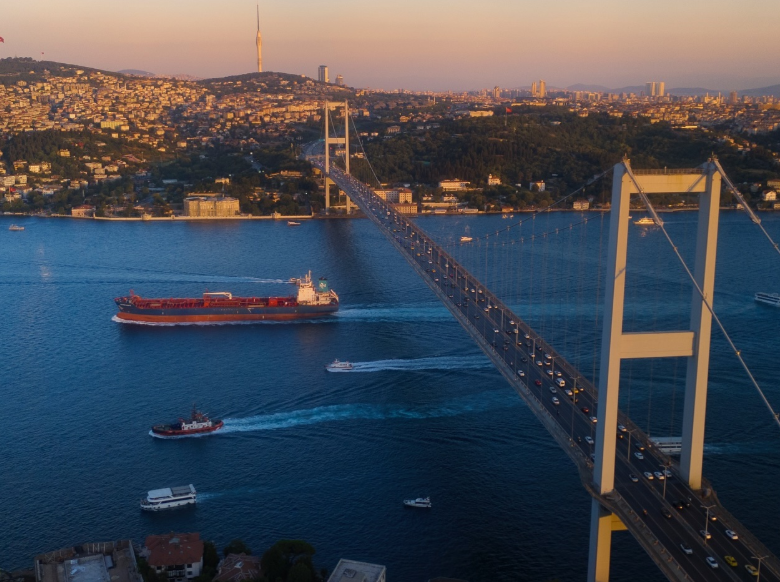
More than three years ago, in February 2022, on the eve of Russia's full-scale invasion, the governments of Ukraine and Turkey signed a Free Trade Agreement (FTA), which concluded 15 years of marathon trade negotiations. However, as of May 2025, the document is still awaiting final approval by the Verkhovna Rada of Ukraine, although Turkey ratified it back in August 2024.
President of Ukraine Volodymyr Zelenskyy during a meeting with representatives of Turkish business on 13 March confirmedthat Ukraine is ready to ratify the FTA Agreement during the upcoming visit of Turkish President Recep Tayyip Erdogan.
This Agreement has been met with mixed reactions among economists and business representatives regarding its impact on the Ukrainian economy, particularly due to the asymmetry in bilateral trade and competitive challenges for domestic producers.
According to provisions Under the FTA agreement, Turkey will impose zero tariffs on 95% of all goods exported by Ukraine. In addition, tariff quotas or reduced tariffs will apply to 1,348 product items. In response, the Ukrainian market will become 99.6% open to Turkey.
The average duty for Ukrainian goods in Turkey will decrease from 28.9% to 10%, and for Turkish goods in Ukraine – from 5% to 0.5%. Since Turkish tariffs are almost six times higher than Ukrainian ones, Ukrainian exports will benefit from the reduction in duties – goods from Ukraine will become much more affordable for Turkish buyers. This could give Ukrainian companies a serious competitive advantage in a market with a population of 85 million.
An important achievement was Ukraine's preservation of the right to apply export duties on scrap metal, which protects the domestic market for raw materials for the metallurgical industry. At the same time, Turkey is opening its market to Ukrainian metal: zero duties are being imposed on 510 out of 840 metallurgical products, with a partial reduction on another 130, giving Ukraine an advantage over Russian metal.
Structural imbalances in bilateral trade between Ukraine and Turkey
Traditionally, Ukraine had a positive trade balance with Turkey, but the situation changed dramatically after the start of the full-scale invasion by the Russian Federation. The destruction of enterprises and the temporary occupation of territories with large agricultural complexes and industry led to a sharp decline in Ukrainian exports. At the same time, the need to restore infrastructure and replace destroyed production facilities stimulated the growth of imports of Turkish goods, from building materials to equipment.
Statistical data for 2024 – first quarter of 2025, according to data The State Statistics Service of Ukraine shows a significant imbalance in bilateral trade between the countries. Ukrainian exports to Turkey in 2024 amounted to $2.21 billion, while imports reached $4.24 billion, creating a negative balance of $2.03 billion. Compared to 2023, Ukrainian exports decreased by 6.8%.
Data for the first quarter of 2025 testify about this trend getting stronger. Ukrainian exports fell to $617.73 million (-14.4% compared to the same period last year), while imports rose to $1.21 billion (+22% compared to the first quarter of 2024). The negative trade balance reached $596.73 million.
The structure of Ukrainian exports to Turkey remains predominantly raw materials. According to trade data for 2024, the largest export items are grain crops (US$745.97 million, 33.8% of total exports), vegetable fats and oils (US$361.58 million, 11.9%) and oilseeds (US$262.58 million, 11.9%). , 16.4%) and oilseeds (USD 262.58 million, 11.9%). Thus, the three main raw material items account for over 62% of Ukrainian exports to Turkey.
At the same time, imports from Turkey are characterised by significantly greater diversification and higher added value. The leading items of Turkish imports in 2024 were mineral fuels (603.5 million US dollars , 14.2%), ferrous metals (USD 511.8 million, 12.1%), electrical machinery (USD 265.2 million, 6.3%), machinery and equipment (USD 226.0 million, 5.3%) and land transport equipment (USD 194.2 million, 4.6%).
Let's try to analyse in detail which sectors will benefit and which will lose out from the FTA between Ukraine and Turkey.
Sectoral analysis of the impact of the FTA Agreement
Metallurgical industry
The Ukrainian metallurgical industry may benefit from the agreement thanks to the opening of the Turkish market to Ukrainian metal. Exports of ferrous metals to Turkey in 2024 amounted to $179.68 million, which is 81.2% more than in 2023. In the first quarter of 2025, this positive trend continued with exports amounting to USD 33.28 million (+112.8% compared to the first quarter of 2024). However, this is only a partial reflection of pre-war volumes – in 2021, metal exports to Turkey reached USD 1.97 billion, or 11 times higher than in 2024.
At the same time, imports of Turkish metal are growing, reaching $511.8 million in 2024 and $147.8 million in the first quarter of 2025. This puts serious pressure on Ukrainian producers, who are losing out on cost due to significantly more expensive energy resources.
Agricultural sector
The agricultural sector remains the main component of Ukrainian exports to Turkey, accounting for about 70% of the total volume. Key items include cereals, oils and oilseeds. The agreement maintains the status quo for cereals and oilseeds, as these products are already exported at zero duty.
Limited access to the Turkish market for Ukrainian processed agricultural products remains a problem. Exports of finished grain products in 2024 amounted to only $9.55 million, which is a drop in the ocean compared to raw grain exports worth $746 million. This once again highlights the need to develop processing capacities to create added value in Ukraine. At the same time, the agreement could significantly increase the presence of Turkish fruit and vegetables on the Ukrainian market, which would put additional pressure on domestic greenhouse and horticultural businesses.
Light industry
Ukraine's light industry faces the greatest risks from the Agreement's entry into force. Imports of Turkish textiles and clothing in 2024 amounted to over $160 million, while Ukrainian exports in this category did not exceed $1 million. In the first quarter of 2025, this trend continued, with imports of Turkish clothing and textiles amounting to over USD 35 million.
Turkish manufacturers have significant competitive advantages thanks to state support, which includes compensation for part of the cost of energy, exemption from certain types of duties and taxes, and partial compensation for interest on loans. Over the past 10 years, Turkish textile imports to Ukraine have exceeded Ukrainian exports by 53 times.
Mechanical engineering
Imports of Turkish machinery and equipment in 2024 amounted to $491.2 million (electrical machinery – $265.2 million, reactors and machinery – $226.0 million), while Ukrainian exports in these categories did not exceed $61 million. This demonstrates a significant technological gap between the countries and risks for Ukrainian machine building.
Prospects for the Agreement: from raw material exports to technological partnership
In addition to the economic aspect, the agreement is of strategic importance due to the deepening of relations with a country that respects Ukraine's territorial integrity and provides assistance during Russian aggression. Turkey has become one of the few partner countries that have not only condemned Russian aggression with words, but also supported Ukraine with concrete actions – from supplying Bayraktar drones to closing the Black Sea straits to Russian military ships.
In addition to providing a platform for negotiations with Russia, Turkey is also a member of the ‘Coalition of the Willing’ and is potentially ready to send its peacekeeping contingent to ensure Ukraine's security after a peaceful settlement is reached.
Military-industrial cooperation between countries could be particularly important. The joint production of AKINCI strike drones with Ukrainian engines has already become a successful example of such a partnership, and the FTA agreement could significantly expand the scope of similar projects. This creates opportunities for Ukraine not only as a supplier of components, but also as a full-fledged partner in the development and production of high-tech defence products.
Once the agreement has been fully ratified, all Black Sea coastal countries, with the exception of the aggressor state, will be united in a single economic space linked to the EU (Turkey has a customs union with the EU), creating new opportunities for regional integration and countering Russian influence in the region.
According to estimates by the Ministry of Economy of Ukraine, total trade turnover between the countries may reach 10 billion US dollars. It is clear that achieving such figures will only be possible after the cessation of military operations and the beginning of the recovery of the Ukrainian economy.
An important element of the Agreement is the inclusion of provisions on e-commerce and the digitisation of trade procedures, which is in line with current trends in international trade. The Agreement also provides for the establishment of single points of contact to simplify business procedures.
The key risk remains the deepening raw material orientation of the Ukrainian economy. The share of raw materials in exports to Turkey increased from 16.7% in 2007 to more than 70% in 2024, while the share of manufactured goods declined significantly. This trend may continue or even intensify after the Agreement enters into force.
To maximise the benefits of the agreement, Ukraine needs to develop a strategy for the development of processing industries with the involvement of Turkish technologies and investments. Particular attention should be paid to the creation of joint ventures in high value-added sectors, which will transform the raw material-oriented nature of Ukrainian exports.
It is necessary to introduce a system for monitoring the impact of the agreement on individual industries, with the possibility of applying protective measures in the event of a sharp increase in imports. The agreement provides for such mechanisms, which must be actively used to protect domestic producers. Particular attention should be paid to supporting light industry and machine building, which are most vulnerable to Turkish competition.
An important condition for the successful implementation of the agreement is the development of financial instruments to support exports, including export credit and insurance for export operations. This will enable Ukrainian companies to compete more effectively in the Turkish market and expand their presence in the region.
The development of human capital through professional training and retraining programmes for working with Turkish partners is of particular importance. Language training, learning about the Turkish business environment and cultural characteristics will be important factors in the success of Ukrainian companies.
In the context of post-war economic recovery and integration into the EU, the agreement with Turkey should be seen as an important element in diversifying Ukraine's economic ties and strengthening our position in regional trade. Successful implementation of the agreement will require active state policy to support the competitiveness of domestic producers, strategic planning for the development of export potential, and effective use of the institutional mechanisms provided for in the Agreement.


